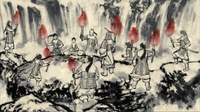
Rice fields in New Yogo
The kingdom of New Yogo (新ヨゴ皇国, Shin Yogo Ōkoku)[1] is a country located on the Nayoro Peninsula and bordered by the Misty Blue Mountains. It is ruled by the Mikado. The capital city is Kosenkyo.
History[]

Torugaru and the Eight Warriors

Origin of New Yogo
According to legend, the kingdom of New Yogo was founded by the hero Torugaru after he defeated a water demon with the aid of eight warriors. He became the first Mikado and established the kingdom of New Yogo alongside Kainan Nanai, the first Master Star Reader. Though history has depicted Torugaru as a hero, in truth he had been a weak-willed man lacking in any remarkable intellect and had originally left Old Yogo due to a dispute over the royal succession rather than from any heroic impulse. Nanai, as the power behind the throne, had been the true driver behind the country's founding[2].
The name "New Yogo" derives from the country from which the Yogoese people originally came, which lies across the ocean to the south. The name "Yogo" means "land blessed by Ten no Kami"[3]. Colloquially, the kingdom of New Yogo is known as "Yogo" in reference to the country and the people who founded it.
Demography[]
The population of New Yogo consists mostly of the Yogo people, who colonized the Nayoro Peninsula. The Yogoese people variously live in large cities or in farmlands. The people revere the Mikado and the Imperial family as divinities chosen by Ten no Kami, the supreme god of the Yogoese. As such, they believe that commoners cannot directly gaze at the Mikado or members of his family or they will be struck blind.
The indigenous population, the Yaku people, continue to reside on the Nayoro Peninsula, though largely away from urban centres, in smaller villages in the countryside. Unlike the Yogoese, the Yaku people tend to believe in the spirits of nature, indicated by the abilities of magic weavers to connect between the material world of Sagu and the spirit world of Nayug.
Though the Yaku are discriminated against, and the nobility and royalty remain pureblood Yogoese, the common people tend to be of mixed Yogo and Yaku descent, such that it is almost impossible by the time of the series to find a village of Yaku without any Yogoese blood[4].
Culture[]
Yogo is shown to have many cultural elements similar to Japan. In particular, in contrast to neighboring countries like Rota, there are no chairs or beds, so people usually seat and sleep on the floor[5].
Economy[]
The country is generally peaceful and prosperous, with rich soil that produces considerable grain. The economy is based on agriculture, including rice farming, and on steelworking. Yogo steel is sought after in neighboring countries because of its strength and durability, and a large district in Kosenkyo (Smith's Row) is devoted solely to steelworking and swordmaking. The industry has become so prevalent that it is negatively affecting the local environment, leading to the near-extinction of the native Nahji bird.
While slavery does not seem to be legal in New Yogo, the country still has a problem with slave traders, especially the Blue Hand.
Military Forces[]
The country has both a large standing army and a navy.
There are 30,000 soldiers and 60+ ships in the navy (up to 100 ships if some of merchant ships are converted into war ships)[6].
Geography[]
The land occupied by New Yogo has a temperate climate, with four visible seasons. The land is fertile, allowing for lush vegetation to grow and agriculture to thrive. A drought has not occurred in the country in a hundred years (thanks to the Nyunga Ro Im, a Nayug water spirit).
The northern edge of the country contains the southern portions of the Misty Blue Mountains, which divide New Yogo from the country of Kanbal. To the south of New Yogo is the country of Sangal and the Yaltash Ocean; to the west, New Yogo borders the country of Rota.
Gallery[]
References[]
- ↑ Romanized as the "Shin Yogo Empire" in the anime
- ↑ Moribito: Guardian of the Spirit
- ↑ Moribito: Guardian of the Spirit, Scholastic translation
- ↑ Guardian of the Dream
- ↑ Guardian of the God
- ↑ Traveler of the Blue Road tankoubon edition p.166